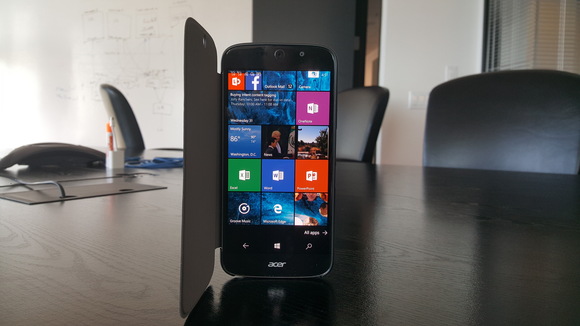Is Microsoft ready to give up on Windows phones?
- By
- November 1, 2016
 It’s curiously enough, but some observers assume the future of Windows phones is not phones themselves.
It’s curiously enough, but some observers assume the future of Windows phones is not phones themselves.
Rumors surrounding a category-defining Surface phone gave rise to a great number of heated discussions and erupted into real dissatisfaction with Microsoft after its press event last Wednesday. How could it be that the company didn’t even make casual mention of Windows 10 Mobile? Nor customers neither partners properly understand why anyone should bother investing in Microsoft’s mobile strategy.
The situation wasn’t even clarified by Terry Myerson, Microsoft executive vice president of Windows and Devices. Obscurity became more preferable than clarity.
“Technically, there are really two things that are unique about Windows Mobile,” Myerson said, when asked why Microsoft was wasting time upgrading Windows 10 Mobile. “One is cellular connectivity and the other one is the ARM processors that are there.”
“So we’re going to continue to invest in ARM and cellular,” Myerson added. “And while I’m not saying what type of device, I think we’ll see devices there, Windows devices, that use ARM chips. I think we’ll see devices that have cellular connectivity.”
Not phones, but devices
No one heard a word “phones” pronounced by Myerson. However, there would be a “tablet” instead. It’s likely to be an ARM-based tablet, perhaps one with cellular connectivity, but not a phone.
To sum up, up-to-date Windows phones run on ARM processors from Qualcomm and others, using Windows 10 Mobile. But as regards Windows tablets, they do not. At one point, of course, they did: the original Surface ran on Windows RT, a version of Windows designed for ARM chips. But consumers earnestly and completely refused the Windows RT tablets, and, as it’s reported, Microsoft scrapped a smaller “Surface Mini” that may or may not have run Surface RT.
Instead, Microsoft doubled down on the Surface Pro 3, which went on to become the Windows tablet that made it easier to define Surface and Windows tablets in general. Microsoft promoted development on what it saw to be a more successful realization of Windows 10 running on top of ARM: Windows phones.
From the position of the observers, it’s a riddle why Microsoft cannot stop developing of Windows 10 Mobile and continue to release its own Lumia hardware, or why ARM and cellular connectivity are thought to be differentiating features for Microsoft alone — and not, you know, every phone ever made. Why didn’t Myerson highlight Continuum, Microsoft’s phone-as-PC argument? Or virtualized Win32 apps, as HP’s Passport uses? He’s an honest man, though, so he’s more likely to answer the question in the way Microsoft is now solving the problem.
No one puts absolute trust in Myerson. But why not to give him a little credit? How often do we use smartphones for their intended purpose? As screen sizes balloon, phones are evolving more into data-driven messaging and computing devices than simple squawk boxes.
One hardly believes that the cratering of Microsoft’s phone business belongs to any master plan to usher in the next big thing. But the door’s still open for something breathtaking to arise from Microsoft’s mobile business. If Myerson is to be believed, however, it may not be a phone.
The original article was firstly published by PCWorld.
- Category: microsoft
- Tags: microsoft, mobile phones, windows 10 mobile, windows phone, windows phone 10
Interesting posts
The Growing Demand for IT Certifications in the Fintech Industry
The fintech industry is experiencing an unprecedented boom, driven by the relentless pace of technological innovation and the increasing integration of financial services with digital platforms. As the lines between finance and technology blur, the need for highly skilled professionals who can navigate both worlds is greater than ever. One of the most effective ways… Read More »
CompTIA Security+ vs. CEH: Entry-Level Cybersecurity Certifications Compared
In today’s digital world, cybersecurity is no longer just a technical concern; it’s a critical business priority. With cyber threats evolving rapidly, organizations of all sizes are seeking skilled professionals to protect their digital assets. For those looking to break into the cybersecurity field, earning a certification is a great way to validate your skills… Read More »
The Evolving Role of ITIL: What’s New in ITIL 4 Managing Professional Transition Exam?
If you’ve been in the IT service management (ITSM) world for a while, you’ve probably heard of ITIL – the framework that’s been guiding IT professionals in delivering high-quality services for decades. The Information Technology Infrastructure Library (ITIL) has evolved significantly over the years, and its latest iteration, ITIL 4, marks a substantial shift in… Read More »
SASE and Zero Trust: How New Security Architectures are Shaping Cisco’s CyberOps Certification
As cybersecurity threats become increasingly sophisticated and pervasive, traditional security models are proving inadequate for today’s complex digital environments. To address these challenges, modern security frameworks such as SASE (Secure Access Service Edge) and Zero Trust are revolutionizing how organizations protect their networks and data. Recognizing the shift towards these advanced security architectures, Cisco has… Read More »
CompTIA’s CASP+ (CAS-004) Gets Tougher: What’s New in Advanced Security Practitioner Certification?
The cybersecurity landscape is constantly evolving, and with it, the certifications that validate the expertise of security professionals must adapt to address new challenges and technologies. CompTIA’s CASP+ (CompTIA Advanced Security Practitioner) certification has long been a hallmark of advanced knowledge in cybersecurity, distinguishing those who are capable of designing, implementing, and managing enterprise-level security… Read More »
Azure DevOps Engineer Expert Certification: What’s Changed in the New AZ-400 Exam Blueprint?
The cloud landscape is evolving at a breakneck pace, and with it, the certifications that validate an IT professional’s skills. One such certification is the Microsoft Certified: DevOps Engineer Expert, which is validated through the AZ-400 exam. This exam has undergone significant changes to reflect the latest trends, tools, and methodologies in the DevOps world.… Read More »


